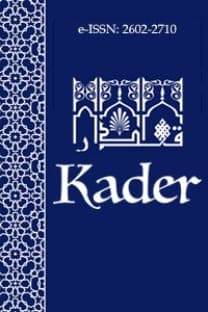Sakarya Halkının Kader Anlayışı
-
-
-,
___
- ABDÜLHAMİD, İrfan (1993), “Cebriyye” DİA, İstanbul: TDV Yayınları.
- AKTAŞ, Ali (2008), Kültürel Renkleriyle Sakarya, Adapazarı: Adapazarı Merkez
- Belediyesi Kültür Yay. AKTAŞ, Ali (2009), Sakarya Rehber, Sakarya: Değişim Yayınları.
- ARSLANTÜRK, Zeki (2001), Sosyal Bilimciler İçin Araştırma Metot ve Teknikleri,
- İstanbul: Çamlıca Yayınları. ESED, Muhammed (2004), Kur’an Mesajı, (Çev. Cahit Koytak, Ahmet Ertürk), İstanbul: İşaret Yayınları.
- GÜLMEZ, Ümmüşerife (2008). Deprem Tecrübesi Yaşayanlarda Dinsel Anlamlandırma
- Biçimleri ve Tutumları, İstanbul: Marmara Üniversitesi Sosyal Bilimler Enstitüsü Yüksek Lisans Tezi. IŞIK, Kemal (1967), Mu’tezile’nin Doğuşu ve Kelami Görüşleri, Ankara: Ankara
- Üniversitesi İlahiyat Fakültesi Yayınları. KARADENİZ, Osman (1992), Ecel Üzerine, İzmir: Anadolu Matbaacılık.
- KOÇAR, Musa (2009), Üniversite Gençliğinin Dini İnançları, Isparta: Süleyman Demirel
- Üniversitesi Yayınları. MATÜRİDİ, Muhammed (2002) Kitabü’t-Tevhid (trc. Bekir Topaloğlu), İstanbul: İSAM Yayınları.
- YAVUZ, Yusuf Şevki (2001) “Kader” DİA, XXIV, 58-63, İstanbul: TDV Yayınları
- Yayın Aralığı: 2
- Başlangıç: 2003
- Yayıncı: Mehmet BULĞEN
TEVHİD-İ ULÛHİYYET KAVRAMI ÜZERİNE BİR DEĞERLENDİRME
İslam ve Ahlak Felsefesi: "Kötülükten Sakındırma" Prensibinin Yardıma Koşmaya Etkisi
Müteşabih Ayetler: Bilişsel Psikolojik Sanat Eserleri
Hz.Peygamberin Otoritesine Dair Bir İsimlendirme Önerisi
Hüseyin Atay, "Kur'an'da İman Esasları ve Kader Sorunu"
Mustafa YILMAZ, Gabriel REYNOLDS
Varsayımlar Olmaksızın Yorum Mümkün müdür?
Kader'i Farklı Kategoriler İçinde Okumanın İmkanı
